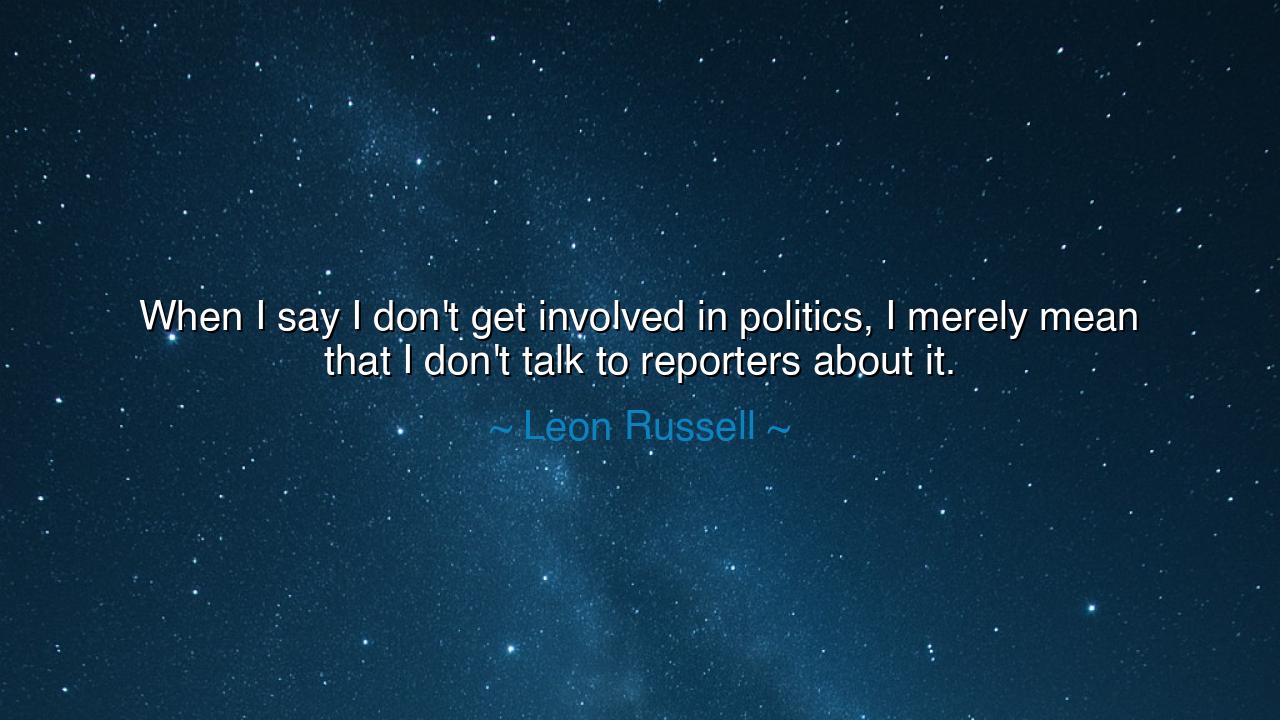
When I say I don't get involved in politics, I merely mean that
When I say I don't get involved in politics, I merely mean that I don't talk to reporters about it.






When Leon Russell declared, “When I say I don’t get involved in politics, I merely mean that I don’t talk to reporters about it,” he spoke with the shrewd wisdom of one who knew the double-edged nature of words. His statement reveals that silence before the public does not mean absence of thought. Rather, it is a shield—a way to guard one’s convictions from distortion and spectacle. For in the realm of politics, words spoken openly are often twisted, while those kept private remain pure.
The ancients knew this tension well. In Athens, Socrates refused to write down his teachings, for he feared the written word would be misused or misunderstood. He chose to speak only in dialogue, where truth could be refined. So too did Russell choose to withhold his political views from reporters, not because he lacked them, but because he knew the danger of entrusting them to an audience eager for scandal rather than wisdom. Silence, in this sense, was not weakness but strategy.
History offers many parallels. Consider George Washington, who despised the poison of partisan politics. Though he surely carried opinions and judgments, he sought to rise above public disputes, knowing that to indulge in them would fracture the fragile unity of his new nation. Like Russell, he understood that to speak too freely on politics could bring more harm than good, and so he guarded his words carefully, speaking only when necessity demanded.
Russell’s statement also reminds us that every soul is political by nature, whether they claim it or not. To live in a community, to vote, to choose, is already to engage in politics. His refusal, then, was not to participate, but to participate wisely—shielding his inner compass from the glare of media and preserving his integrity from being consumed by noise.
Thus, let this wisdom endure: not every conviction must be shouted from the rooftops. There is power in knowing when to speak and when to remain silent. For in a world where every word can be sharpened into a weapon, discretion becomes a kind of armor. Leon Russell’s words remind us that one may still walk the path of justice and truth without feeding the flames of spectacle—for the deepest politics are often practiced in action, not in proclamation.






QVNguyen Quang Vinh
It’s interesting how Russell separates his personal choice to stay out of politics from his unwillingness to talk to reporters about it. Do you think his approach reflects a broader trend of disengagement from politics by many people, especially as the conversation often feels divisive and exhausting? Is there a point where staying out of it becomes a form of privilege or avoidance?
MKTruong Minh Khanh
Leon Russell’s statement offers a thoughtful perspective on how public figures, especially celebrities, navigate political conversations. In a world where everyone seems to have a voice in politics, is it fair for someone to choose to remain quiet in the public sphere? How does this affect their public perception or influence, especially when politics seems to touch every aspect of life?
CPDinh Vu Cong Phuc
This quote feels like Russell is giving us permission to detach ourselves from the constant political noise, especially when it comes to the media. But does this silence inadvertently allow others, with more aggressive stances, to dominate the conversation? How do we balance personal boundaries with the responsibility of being informed and active in political issues?
LBNguyen Luong BaoNgoc
Russell’s quote speaks to the complexity of personal involvement in politics. It suggests that while someone may not publicly discuss politics, they still may have opinions or take actions that impact it. In today’s media-driven world, can any public figure really escape being dragged into political debates, even if they refuse to engage with reporters?
Dduongphuonglinh
Leon Russell seems to be making a distinction between personal disengagement from politics and just avoiding public discussions about it. This raises an interesting point: can we truly avoid politics, or is it simply impossible not to engage with it, even in indirect ways? Do you think it’s more about choosing how and when to engage, especially for public figures?